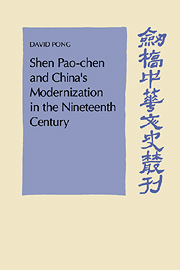Book contents
- Frontmatter
- Contents
- List of maps, tables, and figure
- Acknowledgements
- A note on spelling
- Abbreviations used in the notes
- Introduction
- 1 Early years
- 2 Local official in Kiangsi, 1856–1859
- 3 Governor of Kiangsi, 1862–1865
- 4 First encounters with foreigners
- 5 Director-general of the Foochow Navy Yard
- 6 The Foochow Navy Yard: early developments, 1866—1867
- 7 The Foochow Navy Yard: administration and personnel
- 8 The Foochow Navy Yard: building and training programmes
- 9 The Foochow Navy Yard: financial crises
- 10 The next steps in defence modernization: Ma-wei and beyond
- 11 Towards a plan for self-strengthening
- Conclusion
- Glossary of Chinese characters
- Bibliography
- Index
7 - The Foochow Navy Yard: administration and personnel
Published online by Cambridge University Press: 22 September 2009
- Frontmatter
- Contents
- List of maps, tables, and figure
- Acknowledgements
- A note on spelling
- Abbreviations used in the notes
- Introduction
- 1 Early years
- 2 Local official in Kiangsi, 1856–1859
- 3 Governor of Kiangsi, 1862–1865
- 4 First encounters with foreigners
- 5 Director-general of the Foochow Navy Yard
- 6 The Foochow Navy Yard: early developments, 1866—1867
- 7 The Foochow Navy Yard: administration and personnel
- 8 The Foochow Navy Yard: building and training programmes
- 9 The Foochow Navy Yard: financial crises
- 10 The next steps in defence modernization: Ma-wei and beyond
- 11 Towards a plan for self-strengthening
- Conclusion
- Glossary of Chinese characters
- Bibliography
- Index
Summary
In the closing months of 1867, work at Ma-wei began to see substantial progress. The senior staff was now able to attend to the business at hand. The European engineers and mechanics also began to trickle in from October on. The tasks ahead were to assume far greater complexity than the realms of provincial politics, although relations with Fukien continued to be a major factor. This chapter focuses on Shen's organization and management of the Chinese administrative staff and the European engineers, mechanics, and instructors. Other developments will be dealt with later.
The administrative staff was drawn mainly from the local scholar-gentry class. As a leading gentryman, Shen was keenly aware that a staff composed of such men would be open to nepotism and corruption. But the gentry-scholars posed problems that were far more intricate and subtle. First, given their social and intellectual upbringing, they might prove wanting as managers of a modern enterprise. Second, there was the allure of better jobs elsewhere. It is true that the Navy Yard, headed by an imperial director-general, offered attractive new jobs for the growing number of unemployed or underemployed gentry in the post-Taiping era. But capable men who had acquired some expertise in a modernizing enterprise – the so-called yang-wu experts – were as much in demand elsewhere as at Ma-wei. Moving to another enterprise under a different patron might appeal to some of them. But the modern enterprises, not being organized under a single superstructure, offered little opportunity for upward mobility.
- Type
- Chapter
- Information
- Publisher: Cambridge University PressPrint publication year: 1994



